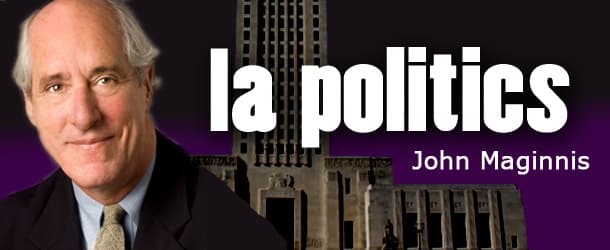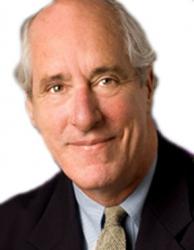John Barry and Russel Honoré are major celebrities in the state, with their fame established in connection to historic floods. Now the author and the retired Army lieutenant general (who is also a published author) are using their status in the state to rally public support to address the manmade impact on the state’s environment in next year’s legislative session.
Though Barry, thanks to Gov. Bobby Jindal, is no longer on the board of the Orleans-area flood protection authority that’s suing 97 oil companies for coastal damages, he remains the most vocal advocate for the legal action. He’s formed a new group, Restore Louisiana Now, whose first mission is to defend the lawsuit against administrative and legislative counter-attack.
For Honoré, whose command brought some order to the chaos after Hurricane Katrina, it took another manmade disaster — the massive sinkhole that figuratively swallowed up the Bayou Corne community — to inspire him to form his “Green Army” to wage battle for the cause he calls “environmental justice.”
Both men plan to mobilize citizen activists to get behind a package of bills during the 2014 session. There they will engage with another “green army” in the persons of a well-paid, entrenched corps of company lobbyists who have held the Capitol for decades.
The major test for both sides could come on an expected bill to limit the power of the flood protection authority to pursue its suit against the oil firms.
Since it’s easier to kill a bill than pass one, the environmental groups could have an advantage on defense. Legislators are influenced by lobbyists to the point when the public starts paying attention to an issue. At that point, attitudes and positions can change quickly.
The first volley in this battle came when Restore Louisiana Now released a poll that showed that more than three-fourths of voters favor letting the suit go forward. An independent statewide poll released at the same time put support for the suit lower, but still at 50 percent for to 36 percent against.
The challenges for the environmentalists will grow stiffer as they move onto the offensive. Honoré is calling for an end to the two-year severance tax emption for horizontal drilling, which companies use along with hydraulic fracturing, or fracking, to unlock oil and natural gas from underground formations. A tax break helped fuel the Haynesville Shale rush, which made many north Louisiana landowners rich. It’s being counted on by companies moving into the Tuscaloosa Shale north of Baton Rouge.
Removing the exemption would take a two-third vote of the Legislature, which is just about impossible to achieve on matters when there’s little opposition; and on this matter, there would be a lot of opposition — right up to the governor’s office.
The same goes for an Honoré proposal to give citizens the power to put referenda directly on the ballot without having to clear the two-thirds legislative hurdle to propose a constitutional amendment. Former Gov. Mike Foster tried that at the peak of his influence with the Legislature in 1996 and it went nowhere. The Legislature isn’t keen on being bypassed.
Similar gloomy prospects await a change the general wants that will force legislators employed by oil and gas companies to recuse themselves from voting on industry-related bills. Such lawmakers would argue they are being discriminated against because colleagues who are lawyers don’t have to recuse themselves from voting on bills related to the legal profession.
Other issues Barry and Honoré may promote, from the regulation of salt caverns to the industrial use of water aquifers, could have fighting chances, but only with informed, persistent lobbying by movement volunteers, backed with grassroots support on the home front.
Even then, the green armies will have to be prepared not to be disappointed when they don’t take the hill on the first charge. As Senate President John Alario, R-Westwego, now in his fifth decade in the Legislature, once mused, “Good bills take three or four years to pass. Bad bills we pass right away.”
The difference the author and the general could make would be in putting well-known names and faces behind causes which untold thousands of potential followers have long supported.
Treasurer’s Job Not Big Enough For Him
State Treasurer John Kennedy is everywhere — never further away than today’s headlines.
Since he was first elected in 1999, he’s searched, plotted and inveigled to expand the duties and power of his office beyond what the Constitution prescribes, which, by law and custom, is to shut up and write the checks.
A statewide-elected official has to do all he can to stay at least in the shadow of the governor, and not to fade into the darkness of political oblivion. Kennedy has patiently, relentlessly, if only marginally, expanded his official influence as treasurer and chairman of the Bond Commission.
He’s made good use of his assets at hand, particularly the once little-noticed Unclaimed Property Fund. What better way to touch the hearts of thousands than by giving them back money they’d lost track of and was turned over to him?
Yet with so large an appetite for public service and attention, the governor’s office seems better suited to his ambition. He clearly is interested in the job, as he regularly offers unsolicited fiscal advice, often in the form of stinging second-guessing, to Gov. Bobby Jindal, as he did to former Gov. Kathleen Blanco.
Lately, he’s broadened and intensified his quest to establish himself as the state’s leading watchdog of the public dollar. This fall, he went after community groups, defined as non-governmental organizations, which have received state funding but not fully reported what they did with the money, as required by law. There may be little if any money left to recover from these groups, some of which are now moribund, but Kennedy is using these examples to lecture the Legislature on how to stop future abuses.
With his crusade against the NGOs playing out, an investigative series by the Times-Picayune and Fox 8 News uncovering abuses, including blatant violations of campaign finance laws, led the treasurer to call for the new Office of Debt Recovery to go after unpaid ethics fines, most of which were owed by unsuccessful candidates. The amount outstanding is only $1 million, but the tracking down of deadbeat politicians makes for good headlines.
That inverse proportion of public dollars actually saved to publicity earned has caused his critics, often his targets, to label Kennedy as a grandstander bent on promoting himself instead of doing anything constructive.
What about construction? He can do that. At a recent ribbon-cutting in Caddo Parish, Kennedy could claim as much credit for the newly completed 19-mile stretch of I-49 North as anyone else holding scissors. While completing the $671 million, 36-mile connection of Shreveport to Arkansas has been a priority of the Jindal administration, Kennedy has come up with big chunks of the funding with the help of his little old Unclaimed Property Fund.
For all the money he tries to return, millions more pour in each year from dormant bank accounts and abandoned safety deposit boxes, utility and rent deposits and tax refunds, building up a kitty of over $500 million. Kennedy had the bright idea for legislation that would stipulate that the money not be left in the treasury but be used to back construction bonds for I-49.
The state will issue $113 million in bonds, with $93 million to go to the last I-49 link to I-20, and $20 million for the longer road to go, I-49 South.
It will take more than unclaimed property to build the southern link. The money may come from everything from possible tolls to dedicated gasoline taxes. But, for now, idle refunds and deposits keep progress going.
All the above has helped earn Kennedy healthy job approval ratings among the three-fourths of likely voters who know him, according to statewide polls. Yet the ground he’s staked out is still within the shadow of Sen. David Vitter, who, like Kennedy, might or might not run for governor in 2015.
A recent independent poll by Southern Media and Opinion Research had Vitter leading comfortably at 30 percent, with Kennedy statistically tied with Lt. Gov. Jay Dardenne in the high teens. It’s questionable that all three of those Republicans would run, because the emergence of a strong Democrat likely would displace one of them. So far, only Dardenne is set on running, while Kennedy’s decision might hinge on what Vitter decides.
In the meantime, acting like he could be governor gives John Kennedy, who turned 62 two weeks ago, just enough to do.















Comments are closed.